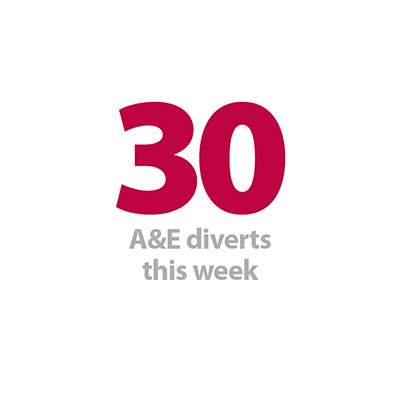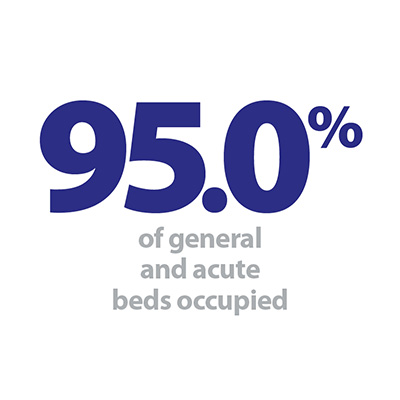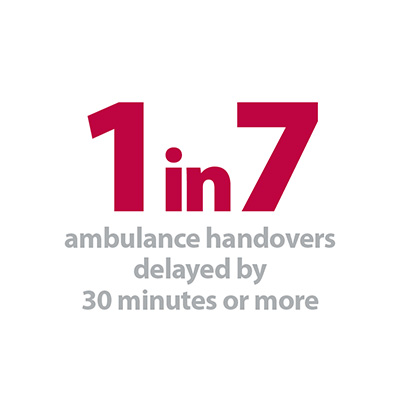


Last week saw some pretty chilly weather in England, which we would expect to herald some challenging performance for the NHS as trusts deal with the increased demand on services from slips, trips and exacerbated respiratory conditions. Some trusts also faced workforce pressures over the cold snap, as staff faced challenges getting in to work for their shifts.
While the data here shows a dip in performance – 15% of ambulance arrivals delayed by over 30 minutes, more A&E diverts than the previous week, bed occupancy creeping up –perhaps what is more notable is that performance didn’t plummet like the temperature did.
One of the things that the data doesn’t reveal is the collective efforts of health service staff who – as a matter of routine - face and overcome extraordinary challenges. Behind the figures there are countless examples of commitment, kindness and compassion which exemplify the best of the NHS. These are often overlooked in the national debate on "how the health service is doing". NHS winter watch will highlight some of the amazing things staff are doing to ensure the best possible care for patients – read on to hear about our first NHS winter heroes!
Delayed transfer of care remains an issue and finding accommodation for people with significant needs relating to dementia and appropriate supported accommodation for those with complex, severe and enduring severe mental illness continues to be a challenge.
Service Director at Sussex Partnership NHS Foundation Trust
But first we hear from John Child, Service Director at Sussex Partnership NHS Foundation Trust, about one of the other things the weekly winter sitreps don’t tell us about, the impact on the wider health sector, beyond acute and ambulance trusts. John, reflects on the challenges they are facing as a mental health, community and specialist learning disability provider, and how some of the acute pressures impact on their services:
"While the pressures on mental health services in winter are different to those in other acute services we have in fact seen an 11% and 7% increase in referrals this Autumn compared to last year in East Sussex and Brighton respectively. This reflects some impact of system pressures in acute services which have a knock on effect on mental health care. This impacts on the utilisation of mental health beds, and despite great efforts to significantly reduce the use of out of area beds for adults over the last few years, we are having to increase our dependence upon them at the moment.
Part of our forward planning in our acute and community improvement programme is to prioritise transferring care from acute services to our community services and will need to work with CCGs and other system partners to achieve this. One area of development is creating 24/7 crisis teams as part of the Five Year Forward view work.
Delayed transfer of care remains an issue and finding accommodation for people with significant needs relating to dementia and appropriate supported accommodation for those with complex, severe and enduring severe mental illness continues to be a challenge.
We are anticipating to feel the impact of the Police and Crime Act in December which reduces the time frames relating to Section 136 Mental Health Act detained patients. Whilst these are positive changes for service users, mental health services are having to absorb the extra demand without an increase in funding. We are pleased to report the first week since the changes has gone well and there is very positive partnership working between the mental health trust and Sussex Police. Sussex Partnership has been awarded winter funding which will support securing additional in-patient capacity to ensure patients remain local and within Sussex when we have excess demand. In addition we will be able to increase the old age psychiatrist resource in the Mental Health Liaison Team at Princes Royal Hospital in Haywards Heath."
Part of our forward planning in our Acute and Community Improvement Programme is to prioritise transferring care from acute services to our community services and will need to work with CCGs and other system partners to achieve this.
Service Director at Sussex Partnership NHS Foundation Trust
Winter Heroes
One of the community midwives at Northampton General Hospital NHS Trust who was on annual leave and getting dressed to go to a Christmas party heard that, due to sickness, there was no midwife for a woman booked in for a home birth. She volunteered to take it on and the baby was safely delivered at home by her later that night. Without the midwife’s dedication the baby’s mother would not have been able to have her planned home birth, but also would have had to travel to a hospital outside the county as all the local maternity units were full.
And at the same trust, staff on one of the wards managed to bring Christmas day forward for a woman dying of cancer and fulfill her wish of having her last magic of Christmas with her family in one of our single rooms. Staff provided a Christmas tree, lights, presents, decorations and ensured the patient was surrounded by her immediate family over that snowy weekend, creating a last Christmas which they will all be able to cherish.
District nurses from Worcestershire Health and Care NHS Trust were out night and day in 12 inches of snow to reach patients requiring insulin injections and other vital medications, while children’s community nurses also battled against the weather to get medical treatment to young people, many of whom have serious long-term illnesses. Other staff worked additional shifts in community hospitals, with some staying overnight to support their colleagues.
At West Midlands Ambulance Service staff who owned 4 x 4 vehicles ferried colleagues to work, and one opened her house up to help those struggling to get home. One paramedic even managed to get a local supermarket to give them some grit to keep roads open for their vehicles. Another camped in sub-zero temperatures just outside Worcester to be close to work and available for the morning shift.
NHS Providers reaction
Responding to the latest figures, the director of policy and strategy at NHS Providers, Saffron Cordery, said:
"The NHS has prepared for winter as never before, and now it is clear those plans are really being put to the test. It is likely that flu and recent cold weather is now beginning to bite. It is worrying to see bed occupancy rates continuing to rise when they were already well above the recommended upper limit of 85 per cent. It is also a concern that more patients are experiencing handover delays when they arrive at hospital by ambulance. This also ties up ambulance crews who may be needed for other emergencies. NHS trusts are working at full stretch to provide the best possible care. The extra winter funding that was announced in the budget has now been allocated. Trusts will need to take urgent decisions on how to make the most of this late boost, to help them through the difficult weeks ahead."